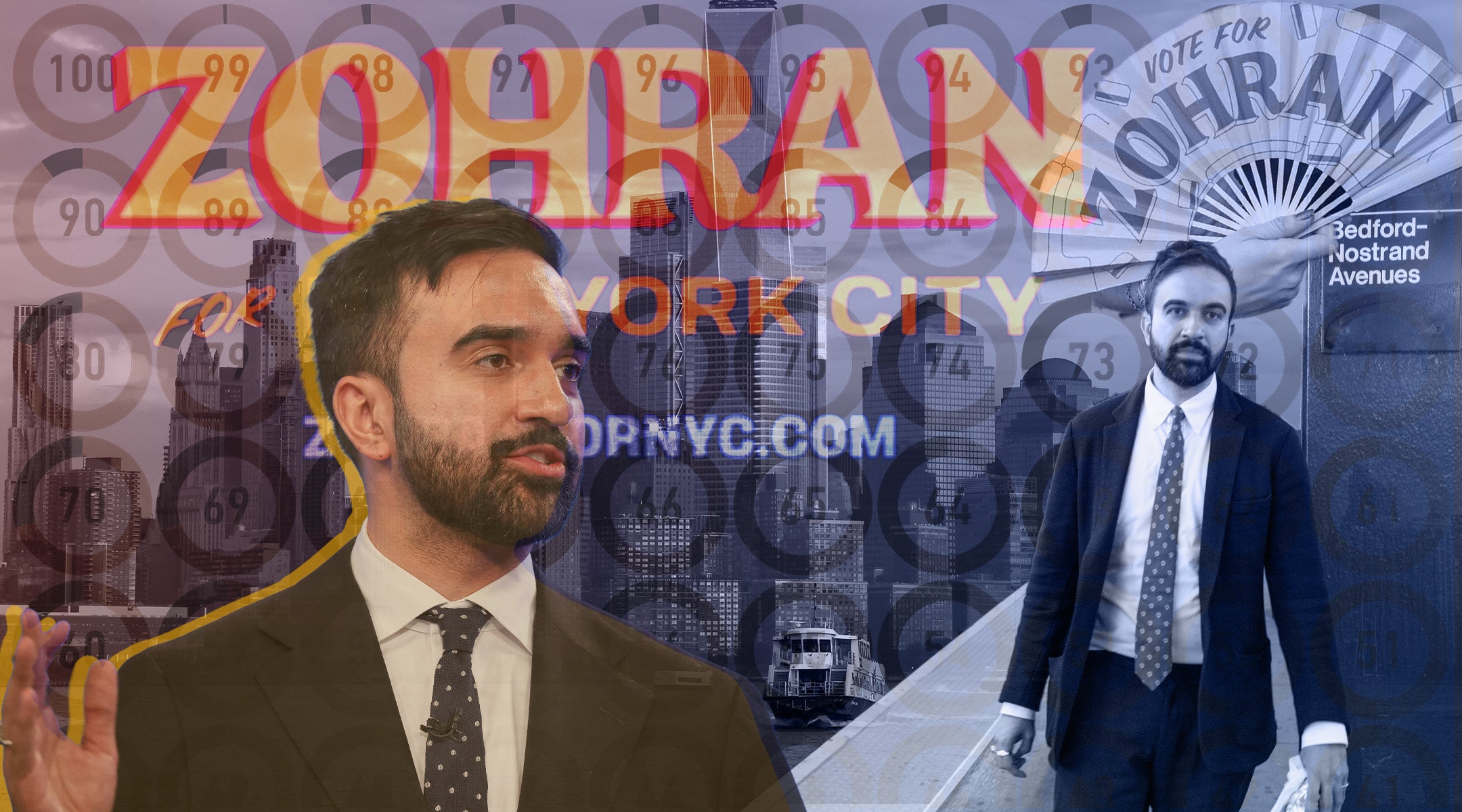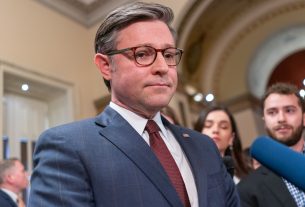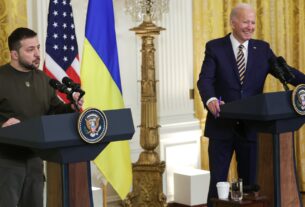With days before the election in which he is favored to become New York City’s next mayor, Zohran Mamdani tells Jewish New Yorkers that he understands why some might be skeptical of him — and that he would work as mayor to protect and celebrate them nonetheless.
“I don’t begrudge folks who are skeptical of me, especially with tens of millions of dollars having been spent against me with the intent to do just that, but I hope to prove that I am someone to build a relationship with, not one to fear,” Mamdani tells the Jewish Telegraphic Agency.
Related: Zohran Mamdani’s record on Jews, Israel and antisemitism | Andrew Cuomo Q&A | Curtis Sliwa Q&A
The comment was included in Mamdani’s written responses to questions submitted by (JEWISH REVIEW) and the New York Jewish Week to his campaign this week. The full Q&A, covering Mamdani’s relationships with Jewish New Yorkers, his policies and principles as a vocal pro-Palestinian advocate, his favorite Hanukkah movie and more, is below.
You have consistently assured Jewish New Yorkers that you will make sure their synagogues are safe on the High Holidays. What is your vision for synagogue security when it is not a major holiday, and would your vision for the Department of Community Safety play a role?
The first step is acknowledging the terrifying rise in antisemitism in our city. As hate crimes overall decreased from 2023 to 2024, antisemitic ones increased. There were 345 antisemitic hate crimes last year, making up more than half of all hate crimes recorded. Many Jewish New Yorkers no longer feel safe to be who they are in this city. Our relationship with houses of worship must be one of collaboration and partnership, and the process for getting NYPD presence should be one that is simple, not one that requires faith leaders to have the mayor on speed dial. I’ve proposed a public safety plan that keeps Jewish New Yorkers safe: Our Department of Community Safety (DCS) will increase funding to combat and prevent hate crimes by 800% with an emphasis on preventing antisemitic hate crimes. My administration will protect Jewish New Yorkers on the street, on the subway, and in their synagogues.
The head of a liberal pro-Israel group at Bowdoin said that you declined to meet with him as SJP’s president because of your group’s policy of “anti-normalization.” How do you view this philosophy today, and how would it inform your interactions with Jewish organizations and Jewish leaders who support Israel and reject your condemnations of Israel, including claims that it committed genocide?
I’ve been honored to meet with countless Jewish leaders and organizations, including many who have different views on Israel and Zionism than my own. I am looking to be a mayor for all New Yorkers and look forward to meeting with anyone who cares about making the most expensive city in America affordable to all who call it home.
You’ve mentioned several times gaining a new awareness of Jewish New Yorkers’ fears about the phrase “globalize the intifada” after speaking with a rabbi. What else have you learned in your conversations with Jewish leaders? What has been most surprising to you? How have your views or plans changed as a result?
While there are countless New Yorkers who have strong feelings on what happens in Israel and Palestine — myself included — I’ve learned that our areas of agreement far outweigh where we disagree. We all have a shared commitment to not only combating antisemitism and hatred in all its forms, but also to celebrating our communities, to making our city more affordable, and to a vision of a world where every human being is created equal.
We have spoken to a number of Jewish leaders who say they have met with you but will not share the content of their conversation. Why do you think it benefits New Yorkers for their contents to remain off the record?
It’s been beautiful to see the depth and the breadth of the Jewish community in our city. We’ve had honest dialogue—which has been overwhelmingly positive. I’m glad to have had the opportunity to introduce myself as I actually am, because many New Yorkers have only known me as a caricature. And I know that some feel that it can be easier to have productive conversations when both sides can be candid in the knowledge that what is said will remain in that room.
You’ve said you intend not to reinvest city funds in Israel bonds, in keeping with Brad Lander’s decision as comptroller. Would you advocate for divesting the city’s pension funds from Israeli securities entirely, as they did from Russian securities in 2022? Are there other ways that you would seek to advance the cause of BDS as mayor?
My priority as mayor will be to deliver on the affordability agenda I ran on: freezing the rent, universal childcare, and fast and free buses. That will always be the core of my administration. I support the approach of the current comptroller, Brad Lander, to end the practice of purchasing Israel bonds in our pension funds, which we do not do for any other nation.
Are there ways you would seek to boycott or sanction local Jewish not-for-profits for supporting Israel and Israelis that support the settlement movement, as you did with your Not On Our Dime bill? In your view, should such efforts apply to Jerusalem as well as the West Bank? Should they extend to organizations that supply humanitarian support to Israelis in the relevant areas?
Charities and nonprofits that receive a taxpayer subsidy should not support the violation of international law, and that’s what the right-wing Israeli settlement project is doing—an effort that goes against the stated foreign policy of our own government, going back several decades.
A handful of your Jewish mentors and friends have emerged through reporting about your history, and all of them openly share your views about Israel and Palestine. Can you tell us about any longstanding relationship you may have with a Jewish New Yorker who differs in that respect?
Of course — many. I moved to this city when I was 7 years old, and one of the joys of growing up in this city was learning about Jewish religion, identity, and culture through so many of my friends and their families — all of whom had a wide variety of politics on Israel and Palestine. Yet it was not the politics that I recall as much as the invitations to be a part of so many special moments — whether being invited over for Hanukkah to a friend’s home, watching “Eight Crazy Nights” as a kid, and going to b’nai mitzvot throughout my young years. I always understood these examples as part of what it means to be a New Yorker and part of what it means to love this city. Growing up on 118th and Riverside, there were so many times where I would be interacting with Jewish culture not even realizing that I was — I just thought it was the city around me.
Patrick Gaspard, a former Obama administration official and DNC chair, told the New Yorker that you were “a prototype for a new generation of American politicians, forged in the Palestinian-rights movement.” What does that mean to you? What do you hope it means for the Democratic Party’s future position on Israel?
My politics, at its core, is fundamentally one of both humanity and consistency. And I think of Dr. King’s words delivered at Riverside Church in Manhattan, when he said: “If America’s soul becomes totally poisoned, part of the autopsy must read: Vietnam. It can never be saved so long as it destroys the deepest hopes of men the world over.” For so many today, myself included, the struggle for Palestinian human rights is also the struggle to save our collective soul. The Democratic Party, if we hope to retain our claim to being the party of dignity and decency, must be a party of consistency and one that stands up for the human rights of all people, without exception.
You have said you support Israel only as a state with equal rights for all – i.e. not a state that privileges adherents of a single religion — and have never marched in the Israel Day parade. How do you square skipping that parade and joining, say, the Pakistan Day Mela, another event celebrating the independence of a foreign nation that embeds religion into governance and has perpetual conflict with its neighbor?
I look forward to joining —and hosting — many community events celebrating Jewish life in New York and the rich Jewish history and culture of our city. While I will not be attending the Israel Day Parade, my lack of attendance should not be mistaken for a refusal to provide security or the necessary permits for its safety. I’ve been very clear: I believe in equal rights for all people—everywhere. That principle guides me consistently.
As mayor, you would control the city’s public school system. You’ve said you would introduce a curriculum that teaches “about the beauty and breadth of the Jewish experience.” Can you explain more about the vision for this curriculum, including who should create it, what grades should experience it, and how Israel would be addressed in it?
The Hidden Voices program is an existing curriculum that was launched in 2018 as an initiative to help students learn about the many “hidden” New Yorkers — including Jewish New Yorkers and others—who have helped shape the fabric of our city and what it has become. I will be a mayor who ensures that these New Yorkers are no longer hidden, and are taught in our schools. Additionally, our Department of Community Safety will invest in data-backed approaches that prevent violence through education and community-building.
Over the past week, 1,100-plus rabbis have signed a letter against the “political normalization” of anti-Zionism and expressing concerns that your criticism of Israel will make some Jewish New Yorkers less safe. How do you view their response to your campaign? Do you think anti-Zionist rhetoric could, in fact, have that effect on Jewish safety?
I’ve appreciated meeting with Jewish New Yorkers all around this city, talking about what we can do to build bridges, and I look forward to continuing to engage in productive dialogue. I hope they know that, whether or not they support or agree with me, I will always be a mayor who protects them and their communities. I don’t begrudge folks who are skeptical of me, especially with tens of millions of dollars having been spent against me with the intent to do just that, but I hope to prove that I am someone to build a relationship with, not one to fear.



